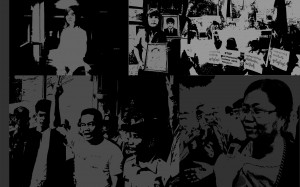The Release of all Human Rights Defenders and Political Prisoners is a Benchmark for Free and Fair Elections
By Burma Partnership • July 29, 2015 Burma Partnership and the Assistance Association for Political Prisoners (AAPP) released the joint report, “How to Defend the Defenders? A Report on the Situation of Human Rights Defenders in Burma and Appropriate Protection Mechanisms” on 25 July 2015. The report highlights the key threats that human rights defenders (HRDs) in Burma face, including oppressive legislation, a corrupt judiciary, violence and a lack of protection, as well as providing policy recommendations to relevant actors. The report points to a picture of a deteriorating human rights situation, in which the authorities are often the main perpetrators or are at least complicit in targeting, oppressing, stifling, controlling and silencing HRDs and the valuable work they carry out.
Burma Partnership and the Assistance Association for Political Prisoners (AAPP) released the joint report, “How to Defend the Defenders? A Report on the Situation of Human Rights Defenders in Burma and Appropriate Protection Mechanisms” on 25 July 2015. The report highlights the key threats that human rights defenders (HRDs) in Burma face, including oppressive legislation, a corrupt judiciary, violence and a lack of protection, as well as providing policy recommendations to relevant actors. The report points to a picture of a deteriorating human rights situation, in which the authorities are often the main perpetrators or are at least complicit in targeting, oppressing, stifling, controlling and silencing HRDs and the valuable work they carry out.
One of the key tools of repression used by the government, the report highlighted, was the use of Section 18 of the Right to Peaceful Assembly and Peaceful Procession Act (the Assembly Law), among other pieces of legislation. As stated by Bo Kyi, Joint Secretary of AAPP, “The Assembly Law continues to be used extensively by the authorities as a tool to imprison and silence HRDs… the legal system is being used to develop and implement oppressive laws, a practice that signifies the real need for legislative and judicial reform in Burma.”
To illustrate the point, human rights activist Su Su Nway was arrested on 23 July 2015 for assisting farmers in Pegu Division as they had attempted to gain recourse for the 1,000 acres of farmland that had been confiscated by the military. Her subsequent arrest and charge for Defamation under the Penal Code demonstrates the impunity that the Burma Army and authorities enjoy, as well as the use of repressive legislation to stifle the work of HRDs.
Another finding of the report that was illustrated by recent, emerging news is the continued use of surveillance, particularly online surveillance, to monitor, harass, and interfere in private communications. This was particularly used during the March 2015 student protests against the National Education Law in Latpadan. It was revealed this week by Wikileaks that discussions were held in 2014 between the Italian firm, ‘The Hacking Team’ that specializes in software for spying and online surveillance, and a company that stated it represented the Ministry of Defence. The spyware firm, ‘The Hacking Team’ offered “active IT intrusion” to the Burma Government, who had shown interest in an “offensive solution.” As highlighted in the report, the student activists were acutely aware of this subversive harassment and interference through online social media that was employed by the Burma Government.
The research from this joint report found that a shocking 45% of women HRDs had experienced sexual harassment, including actual sexual or physical abuse. The perpetrators were diverse, and include the Burma Army, local authorities, members of communities and ethnic armed groups. A lack of understanding and support in communities where sexual abuse occurs further exacerbates the situation.
Overall the report finds that HRDs in Burma are subject to a range of threats, harassment, and intimidation in an attempt to stop them from carrying out their essential, valuable, and legitimate human rights work. The UN Declaration on Human Rights Defenders that was adopted in 1998 outlines the importance of the work that HRDs conduct, and that the best way of promoting and protecting human rights in a country is to defend HRDs. It further outlines how it is the responsibility of the state to protect HRDs and that the international community must hold that state accountable if the state fails to do so.
In Burma’s case, the excessive persecution of HRDs is a flagrant violation of this Declaration, and the international community must be more active in pressuring the Burma Government to end the targeting of HRDs. As former UN Special Rapporteur on the situation of human rights in Burma, Tomás Ojea Quintana wrote in his foreword for this report, “In the midst of the next general elections, we should re-emphasize our ambitions for real and meaningful transformation, because it’s time for democracy, it’s time for politics, it’s time for human rights. And those who defend those values are indispensable.” Now that the national elections are only four months away, the Burma Government must show their respect for the voting rights of these HRDs currently in prison and/or detained, immediately and unconditionally release them and all political prisoners, and drop all charges against those awaiting trials.
Tags: Assistance Association for Political Prisoners, Burma Partnership, Freedom of Assembly, Freedom of Association, Freedom of Expression, Human Rights
This post is in: 2015 Burma Elections, Blog
Related Posts“Prison Conditions in Burma and The Potential for Prison Reform” Report
AAPP launches report entitled ‘Prison Conditions in Burma and the Potential for Prison Reform’
Assistance Association for Political Prisoners-Burma’s Statement
Report on the human rights situation in Burma (January – June, 2016)
Statement – Assistance Association for Political Prisoners (Burma): Month in Review (July 2016)









 All posts
All posts